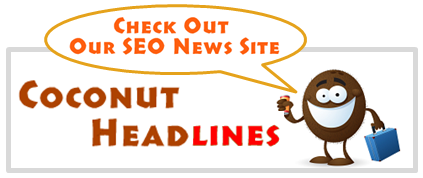It’s often said that you should simply “write great content for your users” in order to do well from an SEO perspective. I think it should be more correctly stated as: “Write great content about a topic that your users care about and which few have done a good job addressing”. There are many aspects of this definition that will be interesting to explore, but what we’re going to address in this article is how to write content “about a topic”. I would argue that the most important step in content optimization is a final “unoptimization” step you should always perform before finalizing any document – to ensure you’ve successfully made the document be *about* the topic you’re targeting. Read on »
Archive for the ‘Online Marketing Strategy’ Category
This is a bit of a rant. There are a variety of annoyances I’ve been encountering with Google’s Advertising and Analytics products, and I thought I’d collect them here. It’s written as a sort of a letter to the Google product teams (addressing them as “you” and so on).
Not to say they are not doing a great job on a lot of fronts! I love the attribution features in Google Analytics…the mobile support AdWords added last year (although problematic) may, admittedly, have been the only realistic way to support mobile devices in a reasonable way; they really do have a lot going on.
Here are some very low-hanging fruit for improvement though Read on »
Commenting in a thoughtful manner can be a great way to engage with your audience and peers, build links, and even garner click-through traffic. I’m *not* talking here about spamming WordPress blogs with thousands of auto-generated comments using automated tools. “Thoughtful” commenting, as I call it, adds value to the conversation, and makes the internet a better place, not a worse one. This article will detail best practices for what can be perfectly legitimate marketing practice, done properly and with the right intentions. Read on »
There are many ways to go about getting links; the different methods vary widely. I recently helped some clients with their linking strategies, and when I did, I researched a wide range of approaches from the perspective of a number of characteristics.
This article presents a massive comparison chart that may even make you reconsider certain link building practices you might already be pursuing. Let’s get a few points straight first though. Read on »
If you want to “Bring Back the SEO Cup”, you would do well to emulate the folks who designed and built the “Stars and Stripes” yacht back in 1986 and ensure that your website has a highly optimized design.
There are a number of SEO design principles for website architecture that have been extensively written on in the industry, including “Mapping Keywords to Content”, “Siloing”, “Keeping Your Website Shallow”, “PageRank Sculpting”, and “Internal Anchor Text Sculpting”. These principles are important because although you may not be able to control how much the outside world links to you, how your website is organized is completely under your own control, so you should take full advantage of your options in designing it.
This article will walk through the theoretical basis of each, so you can understand not only how to apply these principles, but *why* you should.
*Shout-out to my father, Dave Ives, who wrote an early Fast Fourier
Transform computer program that ended up being used to help optimize
the hydrodynamic design of the Stars and Stripes ’87 – great work Dad!
Of the major disciplines in SEO, architecture is perhaps the most important of all. This is because if you don’t take into account Google crawling behavior and Google can’t properly spider your website and discover your content, then it won’t matter if it’s the right content, whether it’s optimized, or whether you have obtained any links to it. It may as well not exist if Google can’t discover it.
You’re probably familiar with Google’s spider program, Googlebot, but there are many other ways that Google visits your website. This posting will attempt to pull them all together, and raises some open questions about Google crawling behavior for the community because some aspects of Google’s numerous spiders are still relatively mysterious. Read on »
Search Engine Tools are a dime a dozen, but most only do a very tiny micro-task; substantially useful tools are few and far between. Here are my personal favorite free search optimization tools for SEO; some may be familiar but hopefully there’s a few surprises in here for you Read on »

We Burned a British Ship *Before* the Boston Tea Party, and Refused to Sign the Constitution until the Bill of Rights was Added
For an SEO consultant in Rhode Island (just as for any business), it’s important to leverage all possible marketing channels to reach potential clients. Word of mouth and references from website design firms and various website and internet solution providers can be key. With this in mind, I recently met with a local RI marketer who may be able to help me with some SEO consulting references, and in the process, I might be able to help him with his clients in RI search optimize their websites. He mentioned he has been doing a lot of on-page optimization for his firm’s marketing services, and even with little to no link building, they are ranking well and getting some good leads.
This prompted me to take a look at whether I rank for any terms people local to me care about, and I don’t. In fact, I have to confess that, while one might think I must be doing all kinds of crazy things to optimize this blog Read on »
For some time now, I’ve been developing a personal news aggregation website focused completely on SEO. I’ve decided to go ahead and make it available to the community at large.
Here’s the features:
Back in late August of last year, some Googlers presented a paper at a conference entitled “HyperLocal, Directions Based Ranking of Places”, where they investigated the possibility of using driving directions logs from Google Maps as a ranking factor in Local Search. In my experience, Google does not publish papers on major ideas unless they have one or more patent applications already filed Read on »










